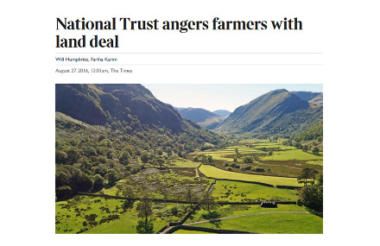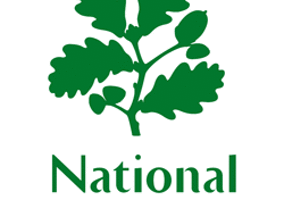Nine critical articles about one charity in two weeks seems to be going too far, argues David Ainsworth.
In the past fortnight The Times newspaper has published no less than nine negative articles about the National Trust, focused chiefly on three issues: whether its decision to buy some land might be bad for sheep, whether it might reduce the flow of a waterfall, and whether it ought to have leased land to a village football team.
It is of course the job of national newspapers to scrutinise our national institutions, but this level of coverage seems curious. The Times has published five critical news pieces, separate issues, and backed it up with four further negative opinion pieces. As much space has been dedicated to a row over three sports pitches as to Theresa May’s visit to China for the G20 summit.
Of course newspapers have in the last two years started to treat charities as a target. This has not been without justification. But sports fields, sheep and Snowdonian waterfalls do not merit the same level of censure as flagrant abuse of fundraising and terrible grant-funding practice from central government.
If they did, you would think, we might have seen some other newspapers engage with the issues in the same consistent way. On the contrary, until the Daily Mail picked up on a Lords debate yesterday, no other newspaper had found these to be matters of national importance.
There are several possibilities as to why this has happened. Perhaps it is simply that Times readers really do care about – and disapprove of – the trust as much as the newspaper’s editorial tone suggests. The paper has received no shortage of spittle-flecked letters damning the charity, and the stories have been well commented. The trust is seen as part of the infrastructure of England – as a quintessential part of our national make-up – particularly among The Times’ wealthy, elderly, country-dwelling demographic. Perhaps The Times analysed its analytics, and found it had a subject too good to pass up.
However it is possible the paper has misjudged its readers, because a lot of the comments online – an unusually high number – have not been supportive of the paper’s stance.
Perhaps it is an accumulative effect. It is quite a common phenomenon in journalism that you write one story, and discover you have become a locus for everyone else with an axe to grind on the same subject, and end up running far more coverage than you intended. Perhaps the paper had no plans to go again, until suddenly it was inundated with stories that were too good to pass up. However I am not sure that either waterfalls or sports pitches fall into that category.
The timing is suspicious, as well. Perhaps it is coincidence, but until 12 August this year The Times was offering a deal which included National Trust membership along with your subscription. Two weeks after that deal lapsed, an avalanche of negative coverage rumbles downhill. Following on the heels of an article on the very day that the deal ended, entitled “The National Trust director’s unwanted opinions keep on coming”.
Having said that, it is only the quantity, not quality of criticism which has changed. Even while it was encouraging people to join the trust, the paper was busy attacking it – accusing it, among other things, of being a housing speculator, dumbing down history, and ripping off its elderly members.
The trust has sensibly remained quiet on the issue. It’s not going to get much benefit from any complaint. Getting into an argument with a journalist, they say, is like getting into a wrestling match with a pig. You both get dirty but the pig likes it.
(Obviously, that saying really applies to the national newspapers. The trade press is a different, more rarefied beast. We slightly lesser known titles are inclined to avoid mudslinging.)
To be fair the latest Times story today is more legitimate than most. It dedicates itself to a House of Lords debate in which the trust is criticised – an angle we’ve taken ourselves. Although The Times has perhaps less defence, since Lord Patten’s outburst, calling for an independent commission to investigate the trust, seems to have been caused by its coverage.
In all, this is a worrying development. We can simply hope that few other charities are targeted in the same way.
Related articles













